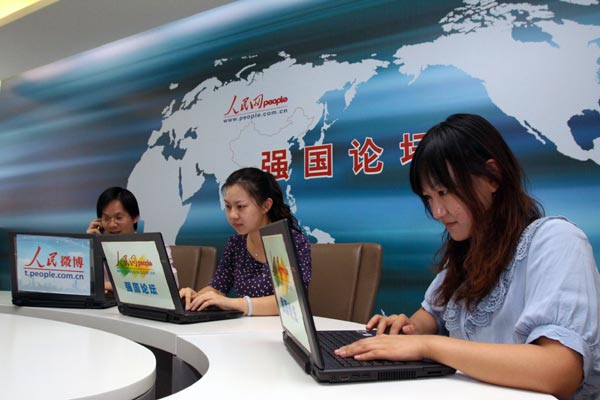Transformation of an industry
Updated: 2012-05-07 07:21
By Jiang Xueqing, Yang Wanli (China Daily)
|
|||||||||||
 |
|
People.cn staff at work in the news center. The organization is the first State-owned news website to list on the stock market. JIANG DONG / CHINA DAILY |
People's Daily website makes headlines, Jiang Xueqing, Yang Wanli report.
For Liao Hong, who is in charge of the website of State-owned Party newspaper People's Daily, the last 10 days have been all about being in the spotlight and working under intense pressure.
As president and editor-in-chief of People.cn Co, Liao oversaw the company's IPO in Shanghai on April 27 as it became China's first major State-owned news website to list on the equity markets.
Like many other recently listed companies, People.cn received an enthusiastic welcome from investors. The company raised 1.38 billion yuan ($219 million), by selling about 69.11 million shares at 20 yuan apiece. It closed at 39.42 yuan on Friday, an increase of 97 percent from the issue price, and its market capitalization reached 10.9 billion yuan, almost twice that of The New York Times Co.
"We believe our company will develop more rapidly with the help of the capital," said Liao, during his first interview since the float, adding that the market capitalization of People.cn is almost the same as that of Sohu, one of China's three main Web portals.
A trend has developed, both in China and globally, for new media enterprises to list on the markets, according to Zhang Yanping, chairman of Beijing Media Corp and president of the Beijing Youth Daily newspaper.
"People.cn attracted investors not only because it is run by the most important Party newspaper in China, one that receives great support from the government, but also because it is able to change in accordance with the development trend of new media," said Zhang. "The company has set a good example for State-owned websites and will encourage many to follow."
In 2009, People.cn and nine other selected State-owned news websites - including Xinhua News Agency's Xinhuanet.com and CCTV.com, the Web presence of China Central Television - started a transformation from government institutions into media enterprises. The remaining nine are currently preparing to follow the IPO trail blazed by People.cn.
Reform accelerated
Some news websites at provincial and municipal level are also accelerating the process of reform. On April 28, Shanghai Orient Webcasting Co was unveiled as a new entity by Eastday.com, a news website jointly established by Shanghai Media & Entertainment Group and several other companies in 2000. Xu Shiping, president and editor-in-chief of the newly formed company said Eastday.com will be transformed into a modern cross-media group and listed company within three to five years. He plans to increase both its capital and revenue to more than 10 billion yuan.
Liu Binjie, general director of the General Administration of Press and Publication, said China has 49 listed companies in the press and publications sector, according to a report by the China News Service in February. Liu said the central government will allow large amount of private capital into the sector and support enterprises that meet the requirements for an IPO to list. To facilitate the development, the government will also introduce policies designed to encourage the participation of private capital.
A raft of IPOs will give fresh impetus to the development of the State-owned media, although it will be a gradual process, according to Chen Gang, a professor at the School of Journalism and Communication at Peking University.
"As a platform of People's Daily, People.cn is likely to create a new development model by adding large amounts of capital to the existing administrative structure. That will further integrate resources based on the original website to form a communication-centered industrial platform with room for development," he said.
"If similar State-owned media do not take this road, their commercial value will remain extremely vague," he added, noting that the government is promoting reform of the cultural administrative system to promote conformity with the law of industry development and to create an environment for healthy competition and development.
|
 |
|
Liao Hong, president and editor-in-chief of People.cn, is confident of future success. JIANG DONG / CHINA DAILY |
Greater transparency
In addition to raising capital, the IPOs will lead to greater transparency because once a company lists, it has a greater responsibility to keep the public informed about its management and operations.
In response to the surge in People.cn's share price, Liao said he expects the company to grow rapidly in three primary businesses: advertising (which contributes almost 60 percent of total revenue), information services (28 percent), and mobile Internet services.
Zhang Yiwu, a professor at the Culture Resources Research Center at Peking University, was impressed by the stock market performance of People.cn. "It shows the great influence of the State-owned media and also people's confidence in its future performance," he said, adding that the success should not be ascribed to the company's position as part of the State-owned media - a unique advantage not enjoyed by commercial websites - but is related to its specific positioning in the marketplace.
"The website is not just a copy of People's Daily, but has good Internet forums that target a specific audience group," he said. "It is a good start as an example of State-owned media stepping into the market economy, but its success will definitely not be repeated across all such media."
Despite the good initial performance of People.cn, some experts said it is still hard to discern the prospects of official news websites becoming listed companies.
"They have an advantage in terms of their official background, but are hampered in terms of their level of marketization," said Gao Hui, a media researcher at Guotai Junan Securities Co. "Their future depends on whether they can utilize their shareholder background and make a breakthrough in marketization at the same time."
Statistics from China Websites Ranking show that People.cn had 28,079 unique visitors out of every 1 million people on Thursday, with an average 6.2 page views per person. On the same day, Sina.com had 239,689 unique visitors and 9.7 page views per person.
"Compared with Sina, People.cn has both money and government support. What it really lacks is good management systems," Gao said.
Liao acknowledged that the company does not have a strong sense of its product or customers. For example, it takes eight minutes to open People's Weibo but only one minute to open Sina Weibo, one of China's most popular micro blogs.
"Having built up solid financial resources, there is a lot of catching up to do in terms of product, customer experience, marketing and brand promotion," he admitted.
Subsidiaries
Because State-owned websites are poor at customer development and maintenance, Gao suggested that People.cn should form a subsidiary company and grant it a high level of managerial independence, so it can develop a performance-appraisal system, similar to those used by commercial Web companies, to attract talent.
People.cn has recruited an advertising team from a commercial website and introduced an entirely new performance-appraisal system. Under the system, if the team meets the target of increasing advertising revenue by 100 percent, the annual salaries of its members will be at least 50 percent higher than in their previous jobs.
And while some people have high expectations, others have argued that IPOs are just a way of pouring more capital into companies and will not result in fundamental changes.
Chen Zhong, founder of Nanfengchuang magazine in Guangdong province, said People.cn is helping to build a market-oriented management system by becoming a listed company, but he doubted whether it will achieve much more.
"Although the company has shape-shifted by launching an IPO, it will fail terribly if there is no major reform of the press system," Chen said. "The stock market is bustling with noise and excitement, but what will happen when the speculative bubble bursts?"
Some media companies have already experienced the evaporation of market value. China Sunshine Media Co listed in 2007. Its total profits slipped to 16.91 million yuan in 2011 from 25.09 million yuan the previous year, a decline of 32.6 percent. During the same period, its earnings-per-share also fell 34 percent to 0.0313 yuan.
Gui Haoming, chief analyst at Shenyin & Wanguo Securities Co, advised investors to take their time when deciding whether to buy shares of People.cn, because higher profits are usually accompanied by higher risks.
"The shares have already performed better than the average general media company," said Gui. "But the high rate of pickup indicates that speculation is on the rise, which is a risky sign for investors."
In his belief that the stock market is an open platform for competition, he is unsure whether listed media companies enjoy unique advantages because of their official identities. "Both good and bad performances will be judged equally by the market. There are no exceptions," he said.
Contact the reporters at jiangxueqing@chinadaily.com.cn or yangwanli@chinadaily.com.cn
Today's Top News
President Xi confident in recovery from quake
H7N9 update: 104 cases, 21 deaths
Telecom workers restore links
Coal mine blast kills 18 in Jilin
Intl scholarship puts China on the map
More bird flu patients discharged
Gold loses sheen, but still a safe bet
US 'turns blind eye to human rights'
Hot Topics
Lunar probe , China growth forecasts, Emission rules get tougher, China seen through 'colored lens', International board,
Editor's Picks

|

|

|

|

|

|





